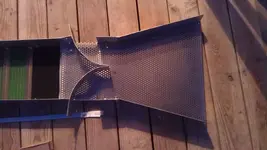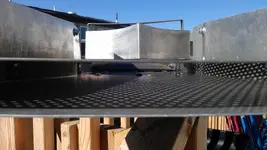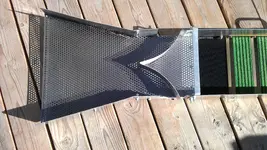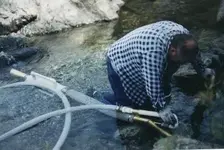Punch Plate
The Punch Plate appears to be a substitute for the Grizzly. The principle is sound, the overburden flows over the surface of the Punch Plate while the heavy Black Sand and Gold go through the holes in the plate and flow into the recovery system.
When I was building my Gould-Gravity-Trap I bought a length of Punch Plate for the length of my Sluice Box. The system seemed to function quite well until I spiked the incoming material with a measured amount of Gold.
When I did a cleanup I was missing the very fine Gold. I ran the same test over and over again with the same results, what is going on, where is the fine Gold going?
This time I poured the material into the front of the Punch Plate and stood over the plate to see what was happening. I could not see any problem it was functioning the way it was supposed to. I changed the incoming flow of water and the higher flow increased the loss of fine Gold where decreasing the flow increased the recovery.
The incoming water splashing around on the plate makes it next to impossible to view it with a magnifying glass, so I decided to take pictures with a high-speed digital camera.
I used the micro setting at a distance of around 12”.
When I processed the pictures in the computer I saw something I could not see with the naked eye. There were little small rivers of fine Gold going around each hole. I could not actually see the larger Gold drop through the hole but I know it had to.
The 20 dollar question is why the little rivers of Gold? At this point I can only speculate on what is going on. I have found with experimentation in the past that water has a high surface tension to small particles. It is much easier to see this if you stop the water flow and leave enough water on the plate to cover it completely. Sprinkle some flour Gold and Black Sand around the diameter of the hole. The height of the powder will build up around the diameter of the hole where it will flatten out farther from the hole.
Take some pictures of this with a micro lens and view the results.




 Here is pictures of the finished product er well proto-type, if it works then I will make one that isn't hacked together. I'm even considering building and selling them.
Here is pictures of the finished product er well proto-type, if it works then I will make one that isn't hacked together. I'm even considering building and selling them.


 fficial&client=firefox-a
fficial&client=firefox-a